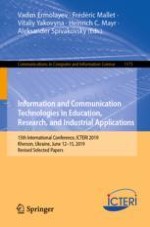2020 | OriginalPaper | Chapter
Optimized Term Extraction Method Based on Computing Merged Partial C-Values
Authors : Victoria Kosa, David Chaves-Fraga, Hennadii Dobrovolskyi, Vadim Ermolayev
Published in: Information and Communication Technologies in Education, Research, and Industrial Applications
Publisher: Springer International Publishing
Activate our intelligent search to find suitable subject content or patents.
Select sections of text to find matching patents with Artificial Intelligence. powered by
Select sections of text to find additional relevant content using AI-assisted search. powered by
